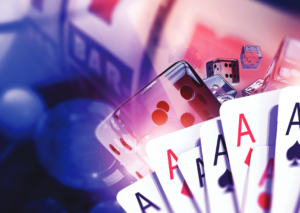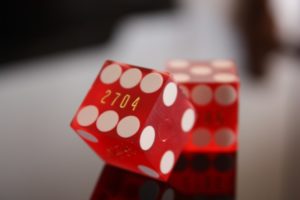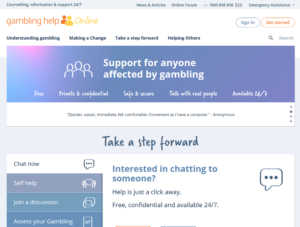
Gambling involves the staking of an item of value (e.g. cash) on an outcome that is at least partly determined by chance. Pretty much all gambling is set up so there is a net loss for players, and a net gain for the provider of the gambling service.
When I was a kid, gambling was simple and kinda boring. Once a year, we’d put a bet on a horse in the Melbourne Cup. My dad would take everyone’s selected horses and visit (in person) the crusty and smokey TAB to put down the bets (in old fashioned cash mind you) in exchange for a white slip of paper. We’d all wait for the race, watch it, lose our money and then get on with life. Not saying it wasn’t a bit of fun at the time, but ultimately my brain decided the fun wasn’t worth the money or time lost.
It is a whole different world now.
Just about every pub has a poker machine room with colourful machines loudly proclaiming the possibility of riches. The internet has made access to online gambling a cinch. Sports betting advertisements play constantly throughout public broadcast sport events. The ubiquitous smartphone means we can bet, anytime, anywhere. Even the humble digital game has become a confusing mess of in-app purchases that promise progression through the game, but are often just gambling in disguise.
In addition to increased avenues for gambling, gambling itself has got significantly more interactive. Take sports gambling for example. You can bet not just on the outcome of the game, but the various components of the game (e.g, individual player performance). You can bet live, as games are happening. You can even create betting groups with your mates so all of you can lose money at the same time 🙂

Gambling in Australia
According to recent data, there are 6.8 million regular gamblers in Australia. What type of gambling do they like? Lottery is the most common (76%), poker is the least (2%).
Although lottery is the most popular activity, regular lottery gamblers spend around half as much per year on gambling compared to pokie players, sports and races gamblers, and casino table game players (e.g poker).
Around 1.1 million regular gamblers (16%) are estimated to have or be at-risk of gambling-related problems. This group accounts for 40% of all gambling activity.
What do we mean by problem gambling?
For most, gambling is a form of entertainment. A form of entertainment that comes with the possibility of winning money, prizes and an accompanying change in lifestyle.
Different types of gambling achieve different entertainment needs. Low skill games (e.g. pokies) are more like a temporary distraction from life and negative moods. I’ve certainly bought the occasional lottery ticket and spent some time fantasising in my head about how I would spend the winnings.
Higher skills games (e.g. cards) in contrast, generate excitement and a sense of challenge as the person attempts to master the skills required to maximise rewards.
Many aspects of gambling are also social in nature (pokies in pubs, syndicates, online groups), so for many people, gambling is a form of social interaction.
There is not a strict definition for when gambling for fun/entertainment becomes problem gambling, but problem gambling is characterised by:
- spending more money or time on gambling than a person wants
- feeling guilty, ashamed and/or worried about gambling
- trying to win back losses
- missing important life events because of gambling
- thinking about gambling all the time
- conflict with family, friends or colleagues about gambling
- lying or stealing to get money for gambling
- getting into significant debt
Problem gambling is associated with a range of negative outcomes. Most obviously, debt and financial problems; but also relationship issues, job loss or difficulties, mental health problems, and negative impacts on family. The greater the negative impact on an individual’s life, the worse the gambling problem.

What causes an individual to develop gambling problems?
There is no single factor that leads an individual to develop gambling problems, but our understanding of the psychology and biology of problem gambling is constantly improving. Here are some contributing factors.
Narrowing of attention/focus and dissociation
Many forms of gambling involve narrowly focused attention, that drowns out other external stimuli (people, places) and internal stimuli (thoughts, feelings). Think about being glued to the TV, watching the lottery or Keno numbers drop. Or the hypnotic repetitiveness of the numbers and pictures spinning around on a Poker machine.
These activities can produce dissociative states which are reinforced by the fact that other negative content (life circumstances, anxious thoughts) can be temporarily filtered out. Basically, gambling provides an effective mental time out from the rest of life’s crap.
Emotional vulnerability
Related to the point above, individuals with mental illness, painful emotional experiences, social isolation, low self-esteem or traumatic histories might find some emotional escape in gambling, because of the narrowed focus of attention and stimulation of reward centres (see biological factors below). This unfortunately puts already vulnerable individuals at risk of additional problems.
Reinforcement schedules
Poker machines are set up to give individuals ‘wins’ on a random ratio reinforcement schedule. What does that mean? It means they pay out regularly, but at random lengths of time. This is a particularly devious schedule as individuals know there is a ‘win’ coming up, but they can’t predict when, so they keep playing. As many psychologists will tell you, getting rid of behaviours that have been shaped using this kind of reinforcement is very difficult.
Problem gamblers have, or develop faulty thinking related to gambling
Individuals who go on to develop problem gambling behaviours commonly show faulty or irrational thinking in relation to gambling. They overestimate their chances of winning. They place trust in ‘luck’ and ‘superstition’. They have impaired memory for previous losses and selective memory for wins. They consider themselves to be in greater control of their behaviour than they really are. They are overly optimistic about winning back previous losses.
Biological factors
The processes of gambling – risk, anticipation, and occasional reward trigger off reward centres in the brain. These are the same kinds of reward centres activated by recreational drug use. Excessive and prolonged activation of these reward centres can lead to the symptoms of addiction such as continued use despite negative consequences, withdrawal effects, and tolerance (seeking bigger thrills and bigger risks).
Individual biochemistry might make certain individuals at more risk than others.
How do I know if I have a gambling problem?
Put simply, if you spend more on gambling that you’d like and/or your gambling is adversely affecting your work, study, or personal life, then there is a good chance you have a gambling problem.
A lot of people don’t seek help until very late, because of the shame and guilt associated with having a gambling problem. Whilst I can’t just make that guilt or shame disappear, I can tell you that the human brain was never designed to be able to withstand the addictive potential of modern gambling opportunities.
If you have a gambling problem, it is not because you are weak or stupid. It is because the methods used by the gambling industry to keep people playing, are highly effective, and often, highly dangerous.
What should I do?
You have a few options.
You could start here – https://www.gamblinghelponline.org.au/ or here – http://www.problemgambling.sa.gov.au/. These are good options if you are perhaps not quite ready to talk to someone you know about what is happening.
If you are Flinders Student, you could come and have a chat to one of our counsellors, who can help you formulate a plan of action.
Whether you are a student or not, South Australian residents who are looking to formally address their gambling problems can contact the Statewide Gambling Therapy Service.
Where can I read more?
Are you concerned that I am making this all up? – maybe have a look at this ABC article or this collection of articles from the Conversation.
There is a lot more written on the dangers of gambling nowadays. Reading additional material might help you a) determine if you have an issue and b) increase your motivation to seek assistance.


